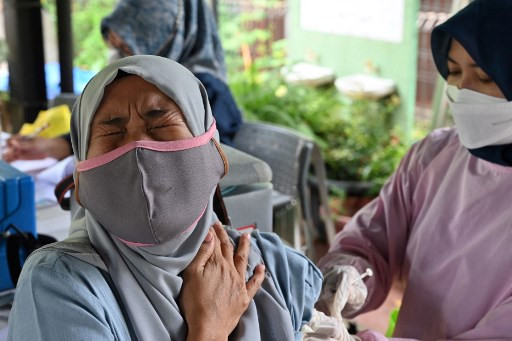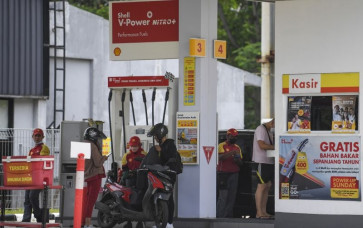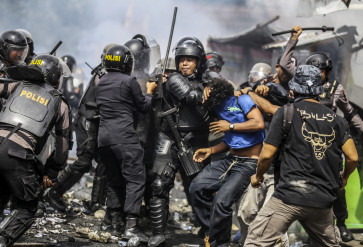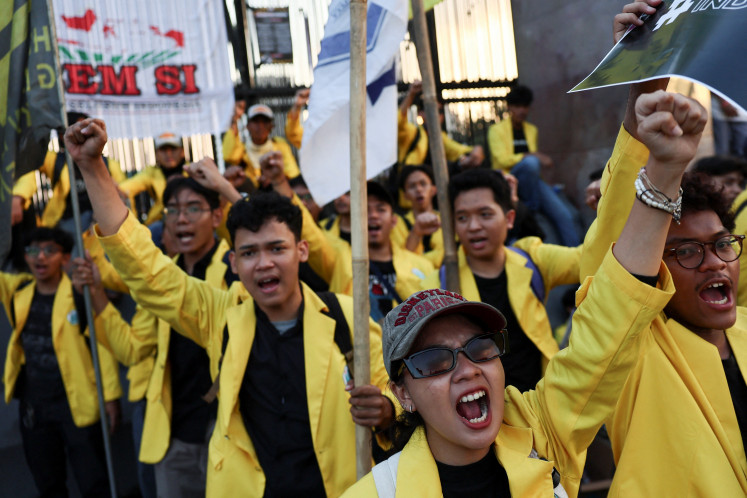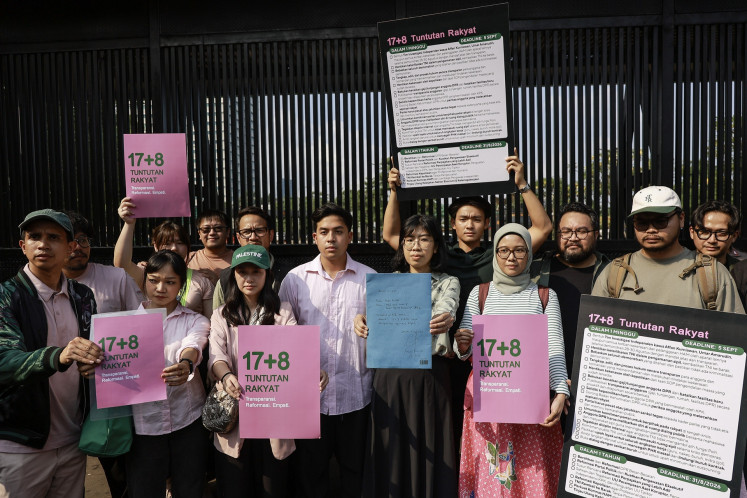Popular Reads
Top Results
Can't find what you're looking for?
View all search resultsPopular Reads
Top Results
Can't find what you're looking for?
View all search resultsRI steps closer to becoming vaccine hub
If the trials are successful, the company seeks to obtain emergency use authorization (EUA) from the Food and Drug Monitoring Agency (BPOM) by next month and start production right away.
Change text size
Gift Premium Articles
to Anyone
I
ndonesia is edging closer to becoming a vaccine hub, as a number of locally developed COVID-19 vaccines enter the advanced stages of clinical trials and are expected to be mass-produced in the next few months.
State-run pharmaceutical firm Bio Farma started on Thursday the phase III clinical trials of a locally made COVID-19 vaccine candidate called the State-owned Enterprises (BUMN) vaccine. It is in the last stage of clinical testing in humans, during which the vaccine is given to thousands of people to confirm and expand the results on its safety and efficacy from phase I and II trials.
The development of the BUMN vaccine started in June of last year in cooperation with Baylor College of Medicine in Texas, the United States. The vaccine candidate, which uses a piece of the coronavirus spike protein called the receptor binding domain as its platform, was first tested on humans in December of last year.
Bio Farma has recruited 4,050 volunteers between the ages of 18 and 70 for the phase III clinical trials. The trials are being conducted in four universities across the country: the University of Indonesia (UI) in West Java, Diponegoro University in Central Java, Andalas University in West Sumatra and Hasanuddin University in South Sulawesi.
If the trials are successful, the company seeks to obtain emergency use authorization (EUA) from the Food and Drug Monitoring Agency (BPOM) by next month and start production right away.
Aside from the BUMN vaccine candidate, a research team from Airlangga University in East Java, in cooperation with local firm Biotis Pharmaceuticals Indonesia, has also recently finished the second round of clinical trials for another homegrown vaccine candidate called the Merah Putih vaccine. It is named after the color of Indonesia's red-and-white flag.
Professor Ni Nyoman Tri Puspaningsih, coordinator for COVID-19 products research at Airlangga University, said the researchers were currently waiting for the green light from the BPOM to conduct the final clinical trials for the Merah Putih vaccine.
Airlangga rector Mohammad Nasih told the press recently that he expected the phase III clinical trials for the vaccine candidate to begin this week, involving some 3,500 volunteers.
Biotis is scheduled to produce the inactivated virus vaccine by July or August if the final stage of the clinical trials goes well.
Indonesia's efforts to produce local COVID-19 vaccines started in the early days of the pandemic, as the country struggled to procure enough vaccine supplies to jab its 208 million targeted population. Seven research teams from various institutions – led by the Education, Culture Research and Technology Ministry – are involved in the project, with each working on different vaccine platforms, from inactivated virus to mRNA technology.
Besides Airlangga University and Biofarma-Baylor College of Medicine, there are five other institutions that are creating homegrown vaccines, including UI in cooperation with privately held pharmaceutical company Etana Biotechnologies Indonesia that are developing DNA, mRNA and virus-like-particle vaccines and the Bandung Institute of Technology with a viral vector vaccine.
Others are Gadjah Mada University, which is working on a protein recombinant vaccine, Padjajaran University in cooperation with Biofarma and Australia-based research company Lipotek on protein recombinant and mRNA vaccines, the National Research and Innovation Agency’s (BRIN) Eijkman Institute for Molecular Biology that is working on a protein recombinant vaccine and BRIN's Biotech research team also working on a protein recombinant vaccine.
BRIN's head of vaccine and drug research Masteria Yunovilsa Putra said that the Eijkman team was currently preparing for the pre-clinical trial for its protein recombinant vaccine but did not give further details on the progress of other teams.
Important milestone
BPOM head Penny K Lukito said the development of the BUMN vaccine was “a giant step for Indonesia in achieving drug and vaccine independence”.
"We hope that the vaccine can become a high-quality, safe, effective vaccine and be a competitive product [globally]," Lukito said in a statement on Thursday.
State-Owned Enterprises Minister Erick Thohir said that the pandemic had revealed the importance of vaccine and drug independence for Indonesia.
"We don't want to continue depending on other countries to fulfill our vaccine and drug demands. [...] The government will continue to support Bio Farma to upgrade its production facilities and to implement other vaccine technologies such as mRNA and viral vector," he said.
Erick said that the company, at the moment, was set to produce some 120 million doses of the BUMN vaccine per year.
"However Bio Farma could ramp up its vaccine production up to 500 million doses per year. We will consider improving its manufacturing capacity if necessary, especially considering Indonesia is aiming to become a global vaccine hub," he said.
Since the early days of the pandemic, President Joko "Jokowi" Widodo has been aiming to make Indonesia a global vaccine manufacturing hub, following difficulties in procuring COVID-19 vaccines for its huge population.
Aside from Bio Farma, which could manufacture 500 million doses of vaccine per year, Biotis has said that it could produce some 240 million doses of vaccine a year, making Indonesia's capacity for producing homegrown coronavirus vaccines stand at around 740 million doses a year.
Indonesia's capacity is still relatively minuscule compared with other vaccine hubs such as China, which can produce up to 7 billion COVID-19 vaccines per year, or India, which could manufacture some 3.3 billion doses of vaccine a year.
Domestic vaccine needs
Despite both BUMN and Merah Putih vaccines being initially designated for primary vaccination in adults, authorities have said that both vaccines would be mainly used as a booster shot and to vaccinate children, as at the moment Indonesia has fully vaccinated most of its population.
As of Tuesday, Indonesia has administered 369 million primary doses of the COVID-19 vaccine to 62 percent of its population. The government is aiming to vaccinate 70 percent of the country's population by the end of the month.
According to the BPOM, Indonesia needs some 44.8 million doses of vaccine to fully vaccinate its targeted population over the age of 12. The country is currently holding some 47 million doses of COVID-19 vaccines from grants and imports.
Meanwhile, Indonesia has only jabbed 23 percent of its 208 million targeted population with a half-dose booster and only 64 percent of the country's 26.4 million children between the ages of 6 and 11 have been fully vaccinated. This means it still needs some 80 million doses of vaccine for the third dose and 15 million doses of vaccine to fully inoculate children.

